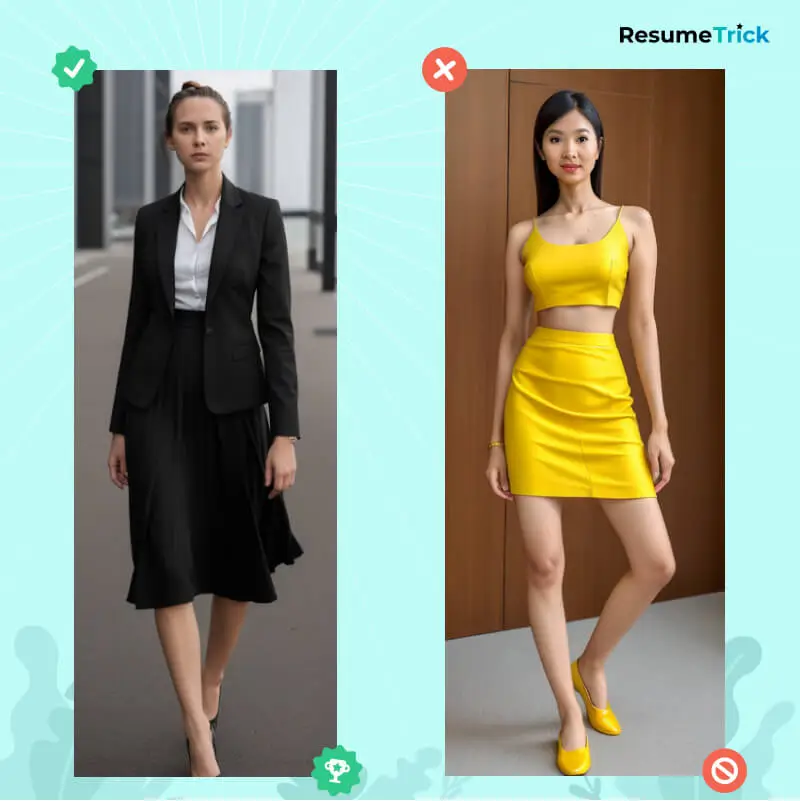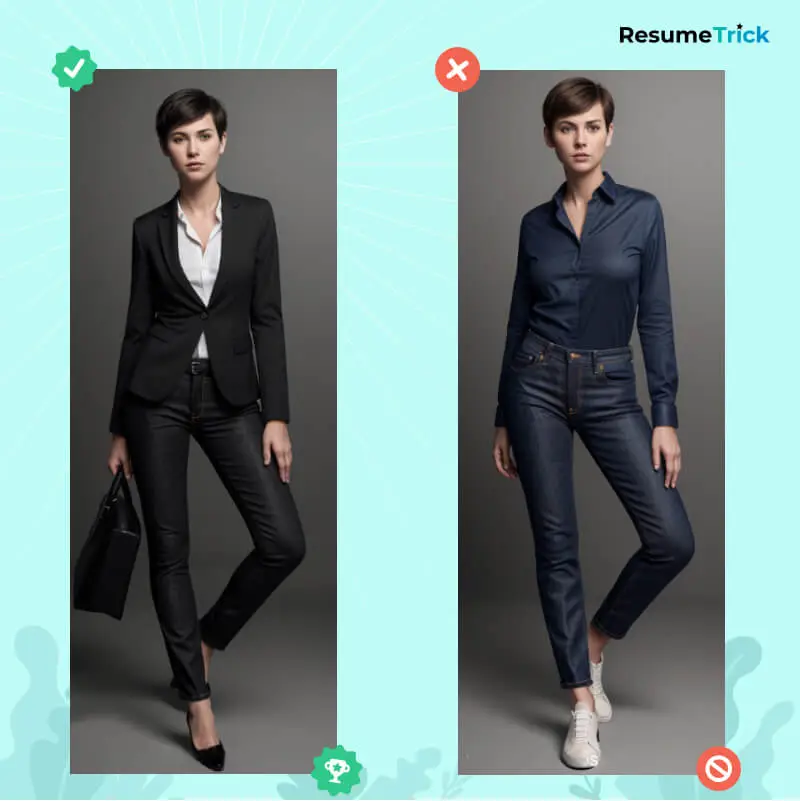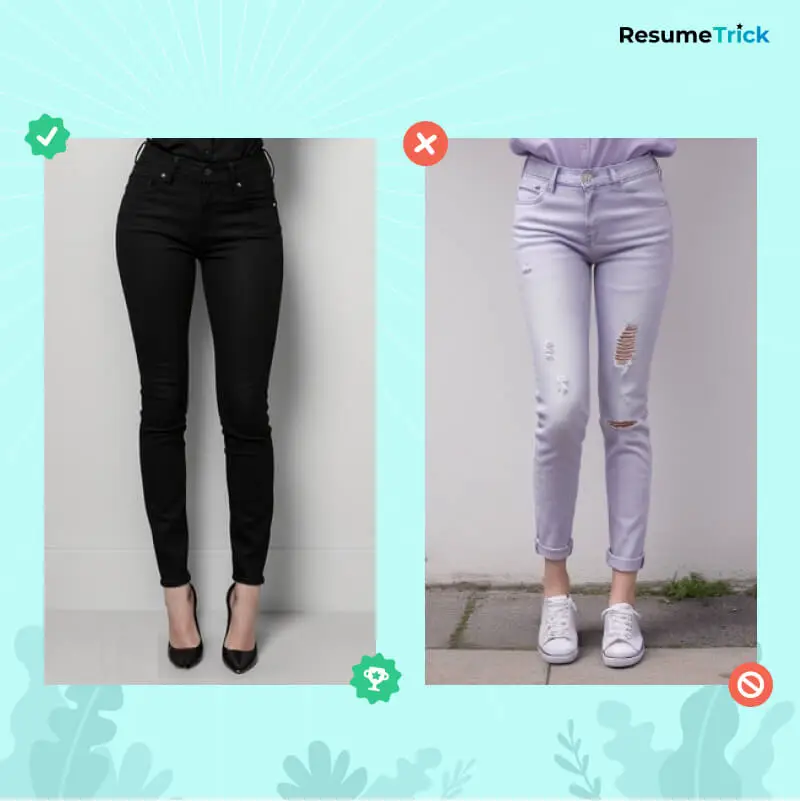In the realm of professional attire, the question "Can you wear jeans to an interview" can stir debate and uncertainty.
As workplaces evolve and dress codes become more relaxed, the once steadfast rules around what constitutes interview attire have also shifted. While jeans were once unambiguously considered inappropriate for such occasions, today's landscape may offer more flexibility.
This article explores the nuances of wearing jeans to an interview, weighing the factors that influence this decision and offering practical guidance to help you make the best impression while dressing true to yourself.
Why does interview dress matter?
To me, clothing is a form of self-expression - there are hints about who you are in what you wear.
Dressing well for a job interview is crucial for several compelling reasons that extend beyond mere appearance.
Here are some key points:
- First impression. Your attire forms the first impression the interviewer will have of you. It sets the tone for how seriously you take the opportunity.
- Respect. You show respect for the company and the professional setting. It indicates that you have made an effort to show yourself in the best possible light.
- Professionalism. Your attire communicates your understanding of professional norms. It reflects your commitment to presenting yourself as a capable and serious candidate.
- Confidence. When you dress well for an interview, you feel more confident. This confidence can positively impact your demeanor, body language, and overall performance.
- Company culture. Different organizations have varying dress codes. Following the interview dress code demonstrates your awareness of rules and ability to adapt to these expectations.
- Memorability. A well-chosen outfit can help you stand out subtly, making it easier for HRs to remember you among many people.

Are jeans appropriate for an interview?
Do you have doubts about donning denim for a job interview? The answer is, that it depends on several factors, primarily the company culture, industry norms, and the specific role you are applying for. While a few businesses may permit a casual dress code, others may insist on professional attire.
Below are some considerations to help you decide whether it is okay to wear jeans to an interview.
Company culture
Understanding the specific culture of the organization can help you make an informed decision about your interview attire. Look for images or videos on the company's website, social media profiles, and employee reviews on sites like Glassdoor.
Always consider the norms of the industry the company operates in:
- Tech and Startups. They often have a more casual approach to the appearance of their employees. Wearing jeans to an interview may be perfectly acceptable.
- Creative Industries. Spheres of advertising, design, or media, may also favor a more trendy dress style.
- Corporate and Finance. These sectors typically expect formal attire, whereas jeans for interviews are not appropriate.
- Retail and Hospitality. Dress codes can vary widely but often lean towards business casual.
- Healthcare and Pharmaceuticals. Professional yet practical clothing is preferred, emphasizing cleanliness and a polished look.
Smaller companies are more likely to have a relaxed dress code compared to large, established corporations which may have stricter policies. Sometimes, the job description can provide hints about the expected interview clothes. If the dress code isn’t explicitly mentioned, don’t hesitate to ask.
Nature of the role
Client-facing roles or positions that involve a high level of professionalism may lean towards more formal attire, while roles in more casual settings might allow for greater flexibility.
Your interview clothing can also reflect your aspirations and readiness for growth within the organization and professional work goals. Choosing attire that aligns with the role's expectations demonstrates your understanding of its requirements.
Level of seniority
For positions at the executive or senior management level, such as CEOs, CFOs, or VPs, a more formal dress code is expected. In this case, jeans are inappropriate interview attire. Roles that involve managerial responsibilities or leadership occupations also require business attire.
Interview format
Types:
- In-person interview. Typically requires the most formal attire. This often means wearing a suit.
- Virtual interview (video call). Even though the interviewer only sees you from the waist up, it’s still important to dress professionally. Jeans might be acceptable in some scenarios, especially if the company has a more casual culture.
- Panel interview. Opt for formal wear to maintain a polished appearance.
- Group interview. Aim for a neat look that balances individuality with conformity to typical business standards.
If you know the interview will take place in an informal setting, such as a coffee shop or a startup environment known for its relaxed culture, jeans can be a good choice. However, always aim to dress slightly more formally than the company’s everyday attire to show respect for the occasion.
Accessorizing
This can also make a difference. Here are some hints on how to accessorize appropriately if you choose to wear jeans to an interview:
- Footwear. Pick leather shoes or loafers. Avoid sneakers or overly casual footwear.
- Topwear. Pair your jeans with a well-ironed, professional top. This could be a button-down shirt, blouse, or a structured top that complements the jeans without appearing too casual.
- Outerwear. If needed, consider adding a blazer or a jacket. This can instantly elevate the look and add a touch of professionalism.
- Jewelry. Keep jewelry simple and understated. Keep away from excessive or flashy pieces. A watch, small earrings, or a simple necklace can complement your look without overwhelming it.
- Bag. Carry a professional-looking bag or briefcase to hold your resume, portfolio, and other essentials. Prefer leather or a similarly structured material.
- Belt. Choose a clean, classic leather belt that matches your shoes to maintain a cohesive and polished appearance.

In case of uncertainty, it's recommended to prioritize being careful and go for a more sophisticated ensemble. Opting for either a suit or dress trousers paired with a shirt is a reliable option for the majority of job interviews.
Which jeans to wear for an interview?
When deciding to wear jeans to an interview, it's important to select the right pair that aligns with the professional context while still reflecting your personal style.
Tips:
- Opt for jeans in a dark wash, such as indigo or black. Darker colors tend to look more polished and formal compared to lighter washes or distressed styles.
- Choose jeans that fit well and have a tailored or slim fit. Avoid jeans that are overly tight or loose.
- Stay away from jeans with excessive distressing, holes, or frayed edges. The jeans should be clean and free from any distracting details.
- Select jeans made from a high-quality denim fabric. This not only enhances the durability and appearance of the jeans but also contributes to a more polished look.
- Stick to classic styles without trendy embellishments or too stitching patterns. Simple and understated designs are more suitable for interviews.
- Ensure the length of the jeans is appropriate. They should ideally reach the top of your shoes without bunching up or dragging on the floor.

What to avoid when dressing for an interview?
Here’s a list of common clothing mistakes:
- Overly casual attire (e.g., t-shirts, flip-flops, athletic wear)
- Flashy or distracting accessories (e.g., oversized jewelry, neon colors)
- Wrinkled or unkempt clothing (e.g., that are not pressed or neatly put together)
- Clothing that don’t fit properly (e.g., too tight or too loose)
- Excessive perfume or cologne (strong scents can be off-putting)
- Hats or sunglasses (unless it’s part of the company’s culture, they can appear unprofessional)
- Unclean or scuffed shoes (always ensure they are polished and in good condition)
- Visible logos or slogans that might distract or convey unintended messages.
FAQ
- When should I avoid wearing jeans to an interview?
- Do not wear jeans to interviews in formal industries like finance or law, or for roles that involve frequent client interactions. Senior-level positions and interviews also warrant more formal interview clothing.
- Can I wear jeans to a second or follow-up interview?
- For subsequent interviews, repeat the dress code you observed during your initial interview. If you wore jeans and the company culture supports it, you can continue with a similar approach.
- Should I consider the season or the weather?
- Sure. In colder months, you can layer with a professional jacket or coat over your outfit. Check your jeans and overall attire are clean, wrinkle-free, and appropriate for the climate.
- What shoes should I wear with jeans to an interview?
- Pick professional shoes, such as loafers, dress boots, or flats. Avoid sneakers or flip-flops, as they may come across as too casual.
- Can I wear jeans if I know the company has a "casual Friday" dress code?
- If the company has such policy, it’s still needed to put on more formal clothes, as interviews are typically more professional occasions.
Can you wear jeans to an interview - conclusion
Don't be into trends. Don't make fashion own you, but you decide what you are, what you want to express by the way you dress and the way you live.
In conclusion, the decision to wear jeans to an interview hinges on several factors: the company's culture, the industry norms, the specific role you're applying for, and the level of formality expected. While jeans may be acceptable in some casual or creative environments, it's crucial to approach this choice with careful preparation.
Always prioritize professionalism and respect for the interview process. If in doubt about whether jeans are appropriate, opt for more formal attire to ensure you make a positive impression.
Ultimately, no matter if you choose jeans or something else, you should strive to present yourself in a confident, professional, and authentic manner.
Create your professional Resume in 10 minutes for FREE
Build My Resume






